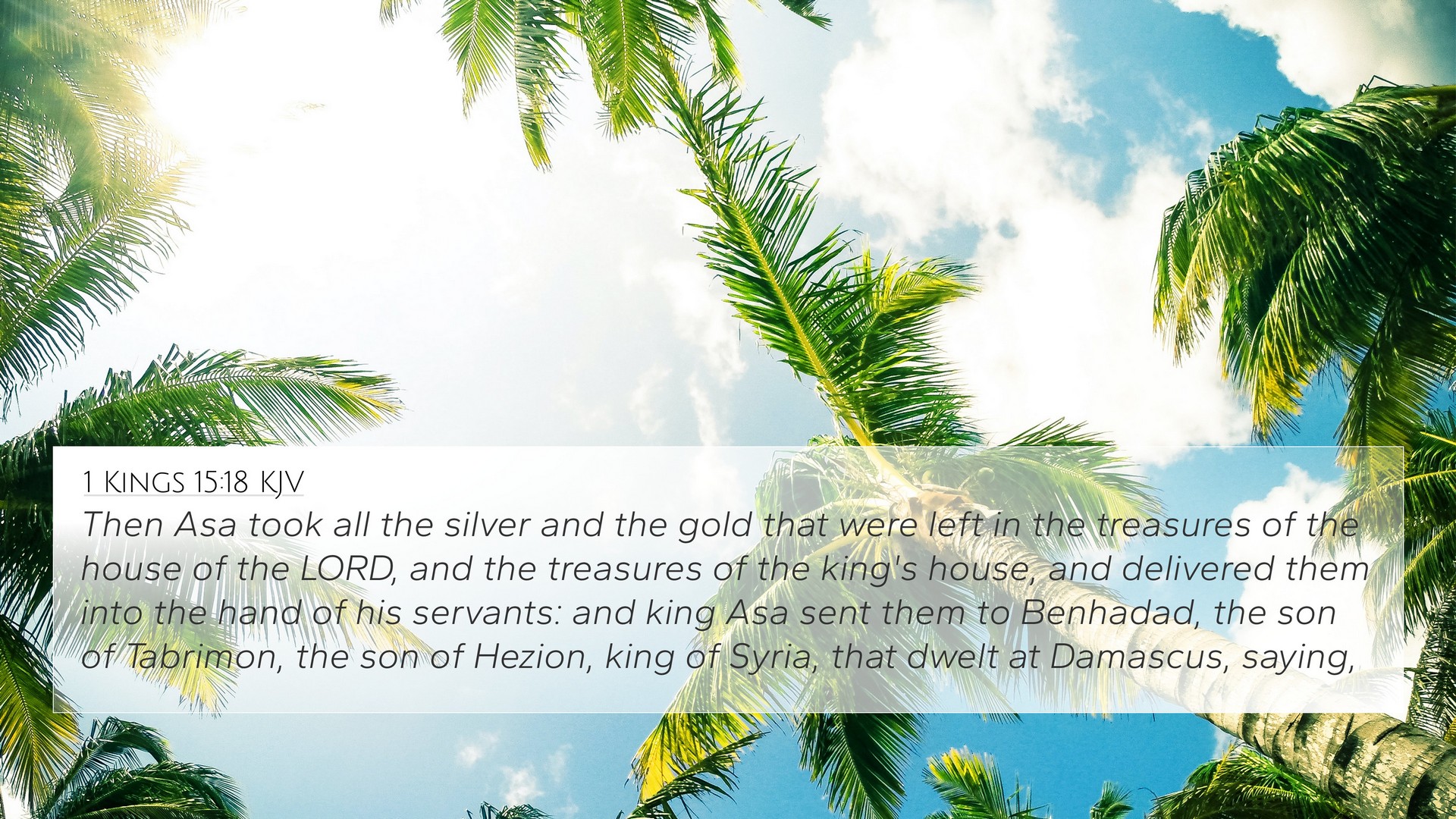Understanding 1 Kings 15:18
1 Kings 15:18 states: “Then Asa brought out the silver and gold that his father had dedicated, and the things which he himself had dedicated, into the house of the LORD, and sent them to Ben-Hadad, king of Syria, who dwelt in Damascus, saying.”
Summary of the Verse Meaning
This verse highlights a significant moment in the reign of Asa, the king of Judah. Asa was known for his reforms and efforts to turn the people back to God. His action in
offering treasures to Ben-Hadad indicates a reliance on foreign alliances rather than solely on God's providence and guidance.
Insights from Public Domain Commentaries
Matthew Henry's Commentary
Matthew Henry emphasizes the significance of Asa's willingness to use the riches of the temple to secure political alliances. He notes that although Asa was faithful
in part, his action demonstrates a lack of complete trust in God. Henry remarks that instead of depending on God’s aid against Israel, Asa looked to the king of Syria,
which might reflect a lapse in spiritual judgment and could lead to future consequences for Judah.
Albert Barnes' Notes on the Bible
Albert Barnes elaborates on Asa's character and actions, noting that while he started as a reformer bringing about significant changes, his reliance on external help
reveals a problematic trend. Barnes warns that such alliances with foreign powers can lead to spiritual compromises and loss of independence. Asa's actions triggered
a series of events that would ultimately affect Judah’s faithfulness to God.
Adam Clarke’s Commentary
Adam Clarke looks closely at the political implications of Asa's decisions. He explains that Asa’s reliance on Ben-Hadad was an act of desperation and that
it undermines the faith that should have been placed in God’s promises. Clarke also discusses how wealth was often seen as a means to achieve peace, yet highlights
that true peace can only be attained through trust in the Lord.
Cross-References and Thematic Connections
To fully understand the implications of 1 Kings 15:18, it is beneficial to explore its connections to other biblical passages. Here are some relevant cross-references:
- 2 Chronicles 14:2-6: Discusses Asa's initial reforms and reliance on God.
- 1 Kings 15:19: Continuation of Asa's communication with Ben-Hadad and an insight into the political landscape.
- 2 Chronicles 16:7-9: Asa's later reliance on a foreign king and the prophet Hanani’s admonition.
- Psalm 20:7: Encouragement to trust in the Lord over worldly alliances.
- Isaiah 31:1: Warning against seeking help from Egypt and turning away from God.
- Jeremiah 17:5-8: Importance of relying on God for security versus man.
- 1 Peter 5:7: Encouragement to cast anxieties on God rather than seeking worldly support.
Inter-Biblical Dialogue and Comparative Analysis
The verse and its context open a dialogue between the Old and New Testament themes of reliance on God versus human means. Asa’s decision to seek help reflects a
broader biblical theme where faithfulness often clashes with human pragmatism. More specifically, we can see how the early church, through the teachings of
the Apostles, echoes the sentiment of placing faith in God.
Conclusion
In conclusion, 1 Kings 15:18 serves as a critical reminder of the delicate balance between faith and reliance on worldly means. The insights from Matthew Henry, Albert
Barnes, and Adam Clarke underscore the importance of steadfast trust in God, which is a continual theme throughout Scripture. As we reflect on this verse, we
are invited to examine our own lives and question where we seek our trust and security. In an age where external help is readily available, the lesson Asa
learned is timeless: true security comes from an unwavering faith in God.
















